24.10.2023

On July 12, 2022, a US military drone captured video of a metallic, spherical orb flying over the Middle East. The US Department of Defense says it was an unidentified anomalous phenomenon (UAP), the term the US government prefers over unidentified flying object (UFO).
US Department of Defense (DoD) official Dr Sean Kirkpatrick, who leads the US government’s investigation into UAPs at the All-domain Anomaly Resolution Office(AARO), described the footage at a public briefing held by NASA in June 2023.
“This is a typical example of the thing we see most of,” he told attendees.
“We see these all over the world, making very interesting apparent manoeuvres.”
At an April 2023 hearing before the Senate Armed Services Committee, Kirkpatrick (who took part in NASA’s independent study of UAPs) testified that 52 per cent of UAP reports the AARO is assessing are “round or spheres.”
A closer look at the July 2022 footage of the UAP suggests a more banal explanation.
It may just be a balloon.
Where’s the UFO?
The declassified footage, captured by an MQ-9 Reaper drone, was partially redacted, obscuring information about the drone’s altitude, speed and location. The DoD titled the video: “Middle East Object.”
Am 12. Juli 2022 nahm eine US-Militärdrohne ein Video einer metallischen, kugelförmigen Kugel auf, die über dem Nahen Osten flog. Das US-Verteidigungsministerium sagt, es handele sich um ein nicht identifiziertes anomales Phänomen (UAP), die Bezeichnung, die die US-Regierung dem nicht identifizierten Flugobjekt (UFO) vorzieht.
Der Beamte des US-Verteidigungsministeriums (DoD), Dr. Sean Kirkpatrick, der die Untersuchung der US-Regierung zu UAPs beim All-domain Anomaly Resolution Office (AARO) leitet, beschrieb das Filmmaterial bei einer öffentlichen Pressekonferenz der NASA im Juni 2023.
„Dies ist ein typisches Beispiel für das, was wir am häufigsten sehen“, sagte er den Teilnehmern.
„Wir sehen diese auf der ganzen Welt und machen sehr interessante scheinbare Manöver.“
Bei einer Anhörung vor dem Streitkräfteausschuss des Senats im April 2023 sagte Kirkpatrick (der an der unabhängigen Studie der NASA zu UAPs teilnahm) aus, dass 52 Prozent der von der AARO bewerteten UAP-Berichte „rund oder kugelförmig“ seien.
Ein genauerer Blick auf die Aufnahmen der UAP vom Juli 2022 legt eine banalere Erklärung nahe.
Es könnte nur ein Ballon sein.
Wo ist das UFO?
Das freigegebene Filmmaterial, das von einer MQ-9 Reaper-Drohne aufgenommen wurde, wurde teilweise geschwärzt, wodurch Informationen über Höhe, Geschwindigkeit und Standort der Drohne verschleiert wurden. Das Verteidigungsministerium betitelte das Video mit „Middle East Object“.
Bellingcat geolocated the video to an area northeast of the Syrian city of Deir ez-Zor. The 25-second video begins at 35.369189, 40.332815 and ends at 35.374540, 40.339181, showing a group of buildings around 800 metres to the northeast.
Some of the features in the drone footage can be matched with features seen in Google Earth imagery from July 2022. Here is a frame from the beginning of the video compared to the relevant Google Earth imagery:
Bellingcat hat das Video in einem Gebiet nordöstlich der syrischen Stadt Deir ez-Zor geolokalisiert. Das 25-sekündige Video beginnt bei 35.369189, 40.332815 und endet bei 35.374540, 40.339181 und zeigt eine Gebäudegruppe etwa 800 Meter nordöstlich.
Einige der Merkmale im Drohnenmaterial können mit Merkmalen abgeglichen werden, die in Google Earth-Bildern vom Juli 2022 zu sehen sind. Hier ist ein Einzelbild vom Anfang des Videos im Vergleich zu den relevanten Google Earth-Bildern:
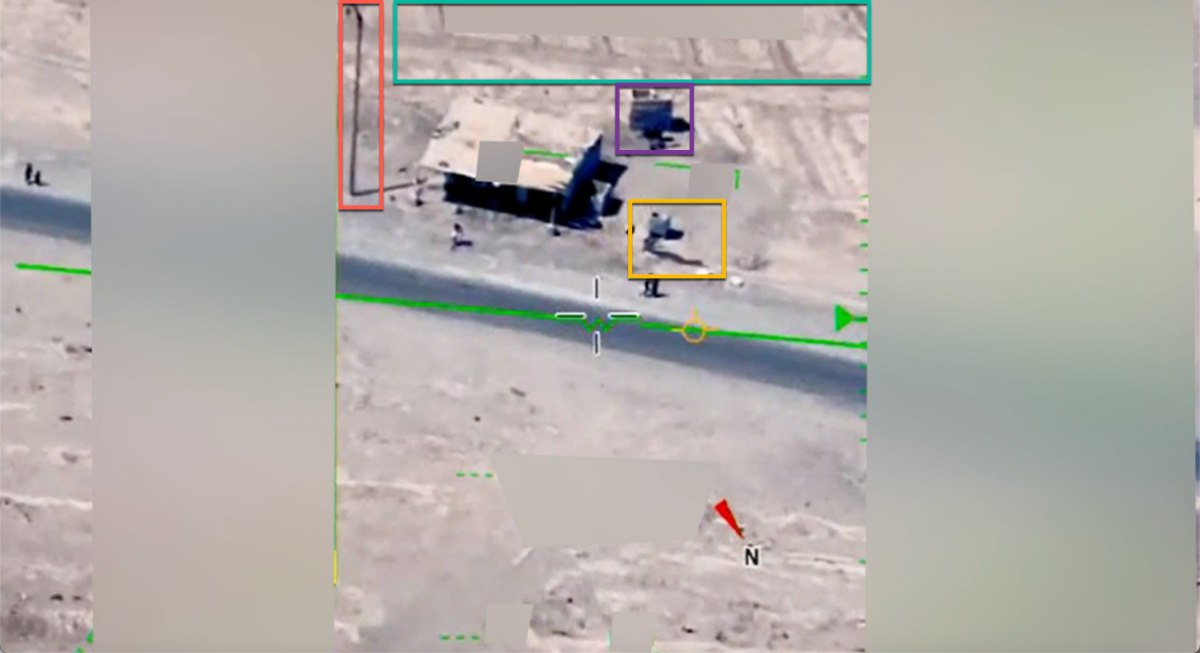

We compared identifying features along the apparent path of the object using a panorama created from the video:

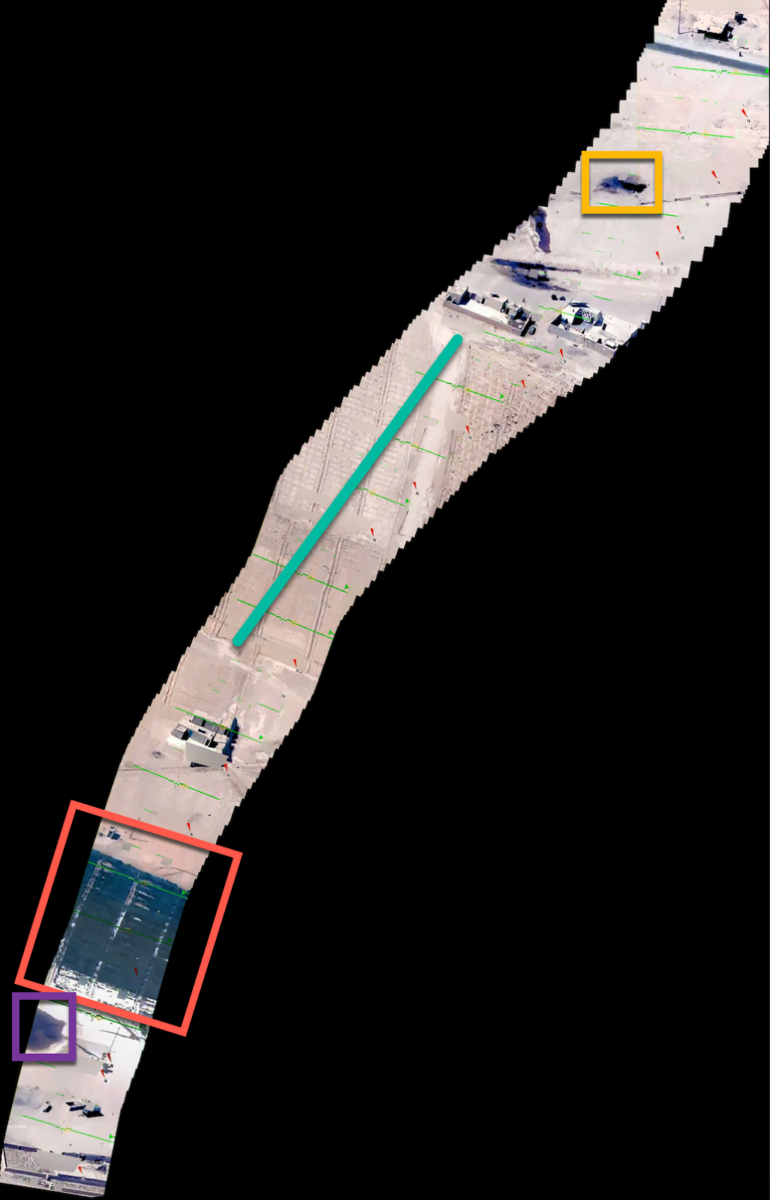
How big is it?
With the geolocation established, it is easy to measure objects on the ground and reference sizes seen in the video.
In the last frame of the video (742), a building allows us to closely estimate the horizontal scale of the image. The section of the wall overlined in red is 337 pixels long (the UFO is circled in the below image in purple).
Wie groß ist es?
Wenn die Geolokalisierung festgelegt ist, ist es einfach, Objekte am Boden und im Video gezeigte Referenzgrößen zu messen.
Im letzten Bild des Videos (742) ermöglicht uns ein Gebäude, den horizontalen Maßstab des Bildes genau abzuschätzen. Der rot überstrichene Abschnitt der Wand ist 337 Pixel lang (das UFO ist im Bild unten lila eingekreist).
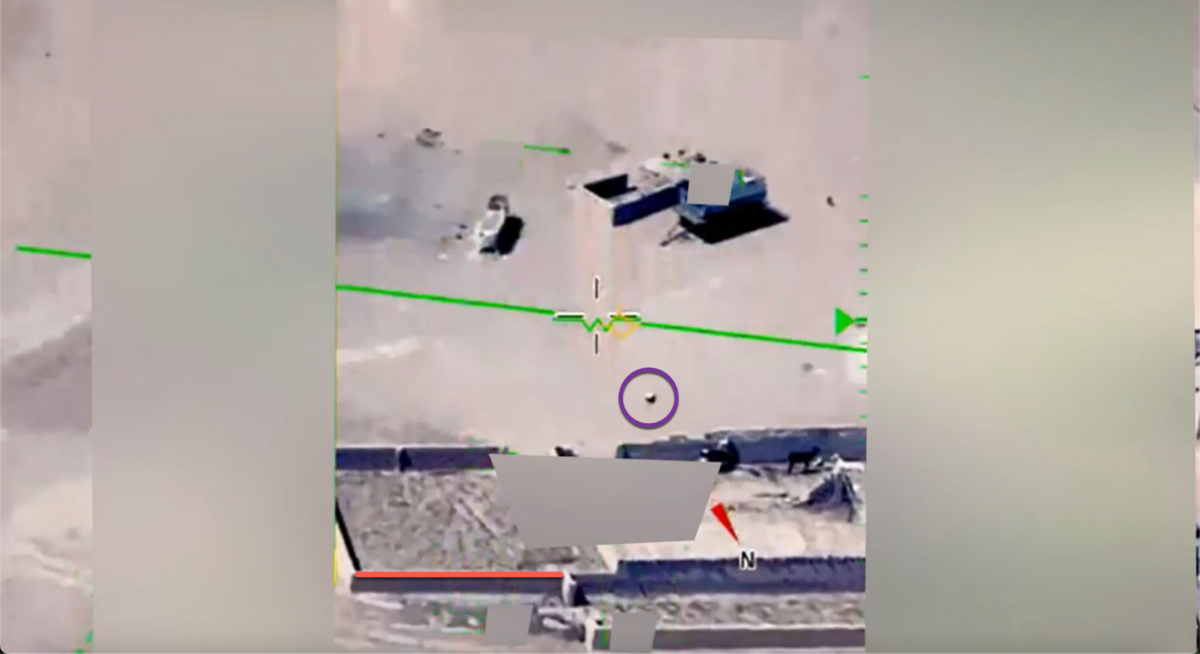
In Google Earth, the section of the wall can be measured to be approximately 11 metres.
In Google Earth kann der Wandabschnitt mit etwa 11 Metern gemessen werden.
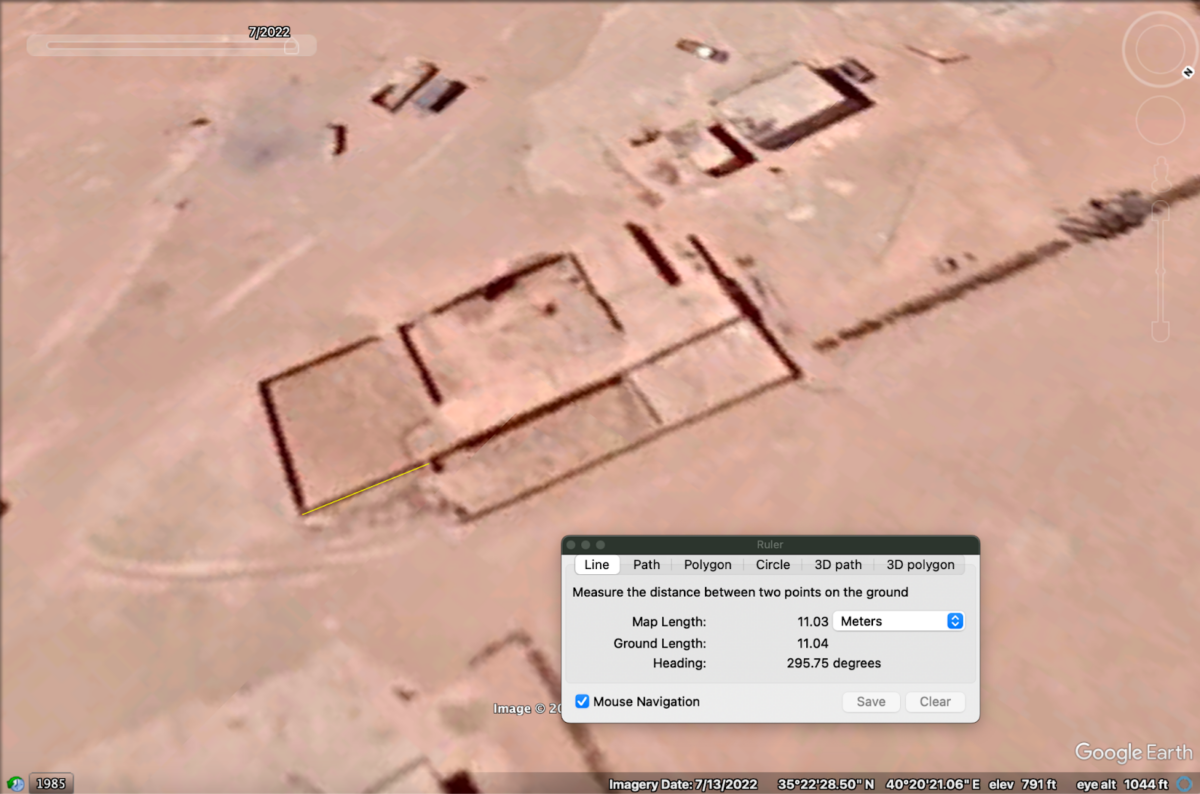
This indicates the horizontal scale of the image is 11 metres / 337 pixels = .033 metres / pixel.
Now, we can measure the horizontal width of the object to be 13 pixels. 13 pixels * 0.033 metres / pixel = 0.43 metres. While this measurement is affected slightly by the angle of the camera with respect to the building, this error is small enough to be inconsequential. However, there is a second issue with this calculation: 0.43m is not the size of the object. It is the size of the object if it were on the ground.
As the object is floating above the ground, it is closer to the drone than the ground is to the drone and it could be smaller than 0.43 metres. It depends on the elevation of the object, which is unknown.
In photography, this is called perspective: the closer an object is to a camera or a person, the larger it appears (and the larger its size in pixels). (You can read Bellingcat’s guide to measuring objects in open source material and dealing with perspective here.)
Therefore, the object has a maximum diameter of approximately 0.43 metres or smaller.
This contradicts the AARO’s own list of ‘typical UAP characteristics’ presented in the video, which states that UAPs are typically between one and four metres in size.
An Illusion of Speed
Kirkpatrick described the footage in the NASA briefing, “We see these [orb-shaped UAPs] making very interesting apparent manoeuvres.” However, he added the orb in the July 2022 video “demonstrated no enigmatic technical capabilities.”
Indeed, the orb appears to fly in a straight line over buildings, people and animals in a sparsely populated, rural area.
During the Senate Armed Services Committee hearing, Kirkpatrick observed how the drone’s camera “will slew [turn or slide violently] to follow it” as it appears to move.
One explanation for why the orb does not demonstrate enigmatic technical capabilities is that it really is just a balloon. The object may not be moving at all, and we are simply witnessing a motion parallax in which the speed of the Reaper Drone relative to the object creates the illusion that the object is moving.
Parallax refers to the difference in the relative positions of objects seen from different perspectives, as illustrated in this diagram.
Dies bedeutet, dass der horizontale Maßstab des Bildes 11 Meter / 337 Pixel = 0,033 Meter / Pixel beträgt.
Jetzt können wir die horizontale Breite des Objekts auf 13 Pixel messen. 13 Pixel * 0,033 Meter / Pixel = 0,43 Meter. Obwohl diese Messung geringfügig durch den Winkel der Kamera zum Gebäude beeinflusst wird, ist dieser Fehler so gering, dass er keine Auswirkungen hat. Bei dieser Berechnung gibt es jedoch ein zweites Problem: 0,43 m ist nicht die Größe des Objekts. Es ist die Größe des Objekts, wenn es auf dem Boden wäre.
Da das Objekt über dem Boden schwebt, ist es näher an der Drohne als der Boden an der Drohne und könnte kleiner als 0,43 Meter sein. Dies hängt von der Höhe des Objekts ab, die unbekannt ist.
In der Fotografie nennt man das Perspektive: Je näher ein Objekt an einer Kamera oder einer Person ist, desto größer erscheint es (und desto größer ist seine Größe in Pixeln). (Hier können Sie Bellingcats Leitfaden zum Messen von Objekten in Open-Source-Material und zum Umgang mit Perspektive lesen.)
Daher hat das Objekt einen maximalen Durchmesser von etwa 0,43 Metern oder weniger.
Dies widerspricht der AARO-eigenen Liste „typischer UAP-Merkmale“, die im Video präsentiert wird und besagt, dass UAPs typischerweise zwischen einem und vier Metern groß sind.
Eine Illusion der Geschwindigkeit
Kirkpatrick beschrieb das Filmmaterial im NASA-Briefing: „Wir sehen, dass diese [kugelförmigen UAPs] scheinbar sehr interessante Manöver durchführen.“ Allerdings fügte er hinzu, dass die Kugel im Video vom Juli 2022 „keine rätselhaften technischen Fähigkeiten demonstrierte“.
Tatsächlich scheint die Kugel in einer geraden Linie über Gebäuden, Menschen und Tieren in einem dünn besiedelten, ländlichen Gebiet zu fliegen.
Während der Anhörung des Streitkräfteausschusses des Senats beobachtete Kirkpatrick, wie die Kamera der Drohne „sich heftig dreht oder rutscht, um ihr zu folgen“, während sie sich zu bewegen scheint.
Eine Erklärung dafür, warum die Kugel keine rätselhaften technischen Fähigkeiten aufweist, ist, dass es sich in Wirklichkeit nur um einen Ballon handelt. Das Objekt bewegt sich möglicherweise überhaupt nicht, und wir sind lediglich Zeuge einer Bewegungsparallaxe, bei der die Geschwindigkeit der Reaper-Drohne relativ zum Objekt die Illusion erzeugt, dass sich das Objekt bewegt.
Parallaxe bezieht sich auf den Unterschied in der relativen Position von Objekten aus verschiedenen Perspektiven, wie in diesem Diagramm dargestellt.
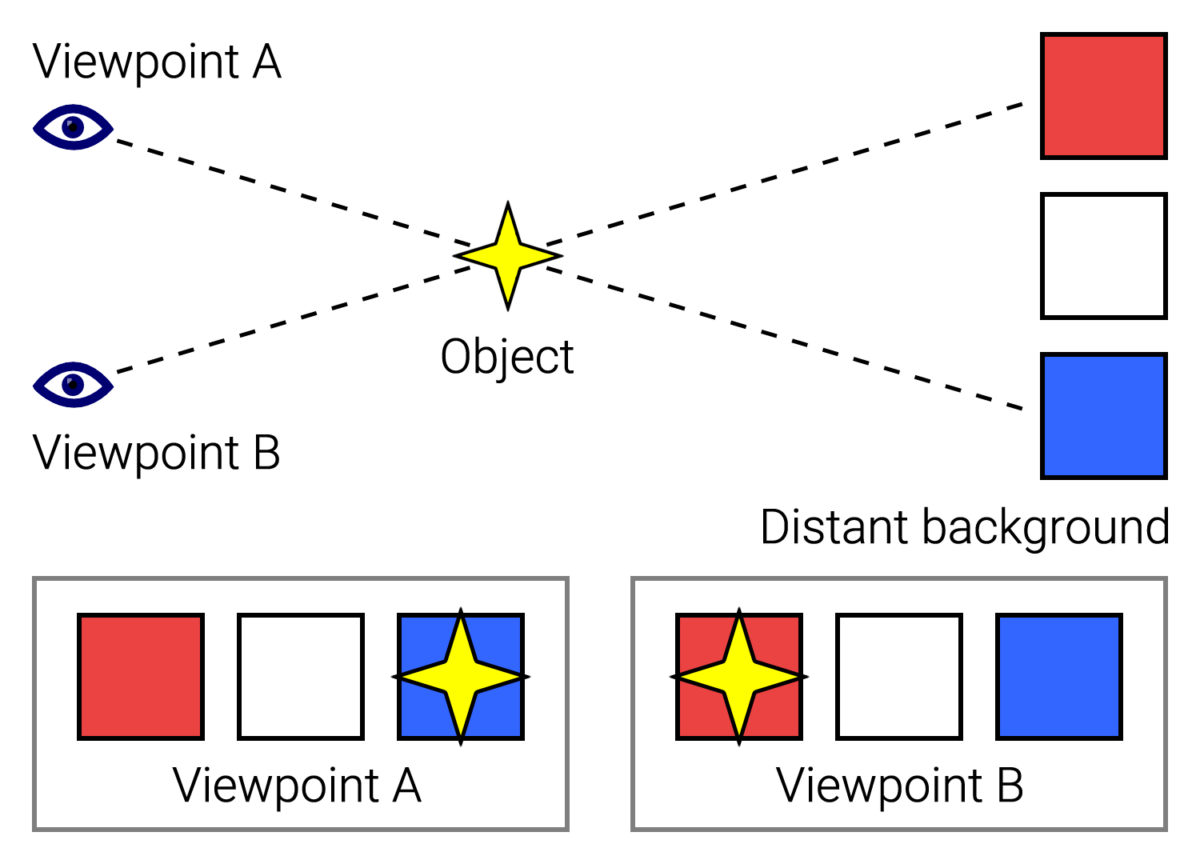
Objects closer to the viewer can appear to move faster than objects farther away, just as when looking out of a car window trees in the foreground seem to fly by while mountains in the distance barely move.
It’s not possible, based on the footage alone, to determine which direction the object is moving, or that it is moving at all. The parallax illusion can produce the impression of movement even where none exists.
Far from being a novel interpretation of UFO videos, parallax is a commonly cited explanation of seemingly inexplicable activity. For example, the “Tic Tac” videodeclassified by the DoD can be explained by parallax.
The parallax hypothesis does not require any outlandish assumptions. While we do not know the speed or altitude of the drone, we assume that the drone is flying at roughly cruising speed (150 to 170 knots or 277.8 to 314.84 kilometres per hour), and at operational altitude (25,000 feet or 7.62 kilometres). We also assume that it is likely flying roughly towards the scene it is looking at, as the first few seconds (0:04 to 0:09) of the video appear to indicate. Small amounts of movement in other directions would generally increase the calculated speeds in the diagrams below, but would not impact the plausibility of the parallax hypothesis.
Objekte, die dem Betrachter näher sind, scheinen sich schneller zu bewegen als Objekte, die weiter entfernt sind, so wie beim Blick aus dem Autofenster Bäume im Vordergrund vorbeizufliegen scheinen, während sich Berge in der Ferne kaum bewegen.
Es ist allein anhand des Filmmaterials nicht möglich, festzustellen, in welche Richtung sich das Objekt bewegt oder ob es sich überhaupt bewegt. Die Parallaxenillusion kann den Eindruck einer Bewegung erzeugen, auch wenn keine vorhanden ist.
Parallaxe ist keine neuartige Interpretation von UFO-Videos, sondern eine häufig zitierte Erklärung für scheinbar unerklärliche Aktivitäten. Beispielsweise kann das vom Verteidigungsministerium freigegebene „Tic Tac“-Video durch Parallaxe erklärt werden.
Die Parallaxenhypothese erfordert keine ausgefallenen Annahmen. Obwohl wir weder die Geschwindigkeit noch die Höhe der Drohne kennen, gehen wir davon aus, dass die Drohne ungefähr mit Reisegeschwindigkeit (150 bis 170 Knoten oder 277,8 bis 314,84 Kilometer pro Stunde) und in Betriebshöhe (25.000 Fuß oder 7,62 Kilometer) fliegt. Wir gehen auch davon aus, dass es wahrscheinlich ungefähr auf die Szene zufliegt, die es gerade betrachtet, wie die ersten paar Sekunden (0:04 bis 0:09) des Videos anzudeuten scheinen. Kleine Bewegungen in andere Richtungen würden im Allgemeinen die berechneten Geschwindigkeiten in den folgenden Diagrammen erhöhen, hätten jedoch keinen Einfluss auf die Plausibilität der Parallaxenhypothese.

The diagrams below illustrate an example of how the parallax hypothesis works with these assumptions. Small deviations from these assumptions (such as the drone looking in the direction of 11 o’clock instead of 12 o’clock) will not substantially change the geometric conclusions.
Die folgenden Diagramme veranschaulichen beispielhaft, wie die Parallaxenhypothese mit diesen Annahmen funktioniert. Kleine Abweichungen von diesen Annahmen (z. B. der Blick der Drohne in Richtung 11 Uhr statt 12 Uhr) werden die geometrischen Schlussfolgerungen nicht wesentlich ändern.
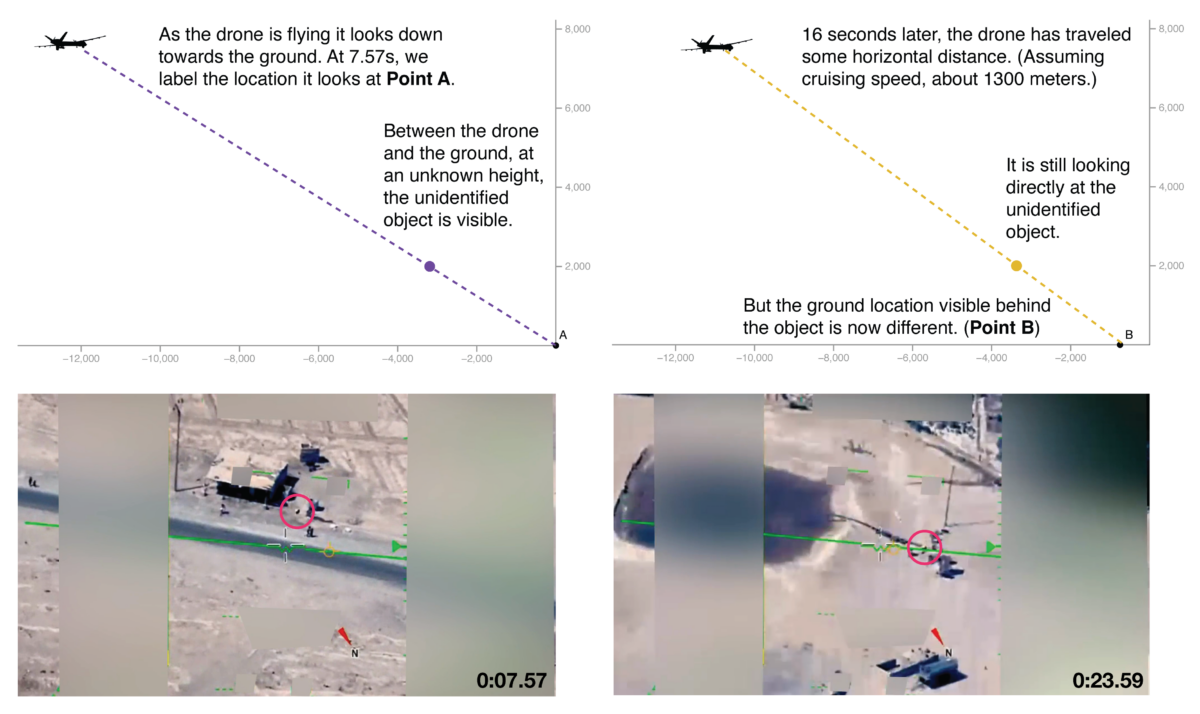
Points A and B can be measured in Google Earth to be about 750 metres from each other. Point A is seen in the frame at the left, at 0:07.6 seconds in the video. Point B, seen on the right, is visible at 0:023.6 seconds, about 16 seconds later. However, this does not mean that the object travelled 750 metres in 16 seconds (169 kilometres per hour).
In Google Earth kann gemessen werden, dass die Punkte A und B etwa 750 Meter voneinander entfernt sind. Punkt A ist im Bild links bei 0:07,6 Sekunden im Video zu sehen. Punkt B, rechts zu sehen, ist bei 0:023,6 Sekunden sichtbar, etwa 16 Sekunden später. Dies bedeutet jedoch nicht, dass das Objekt in 16 Sekunden 750 Meter (169 Kilometer pro Stunde) zurückgelegt hat.
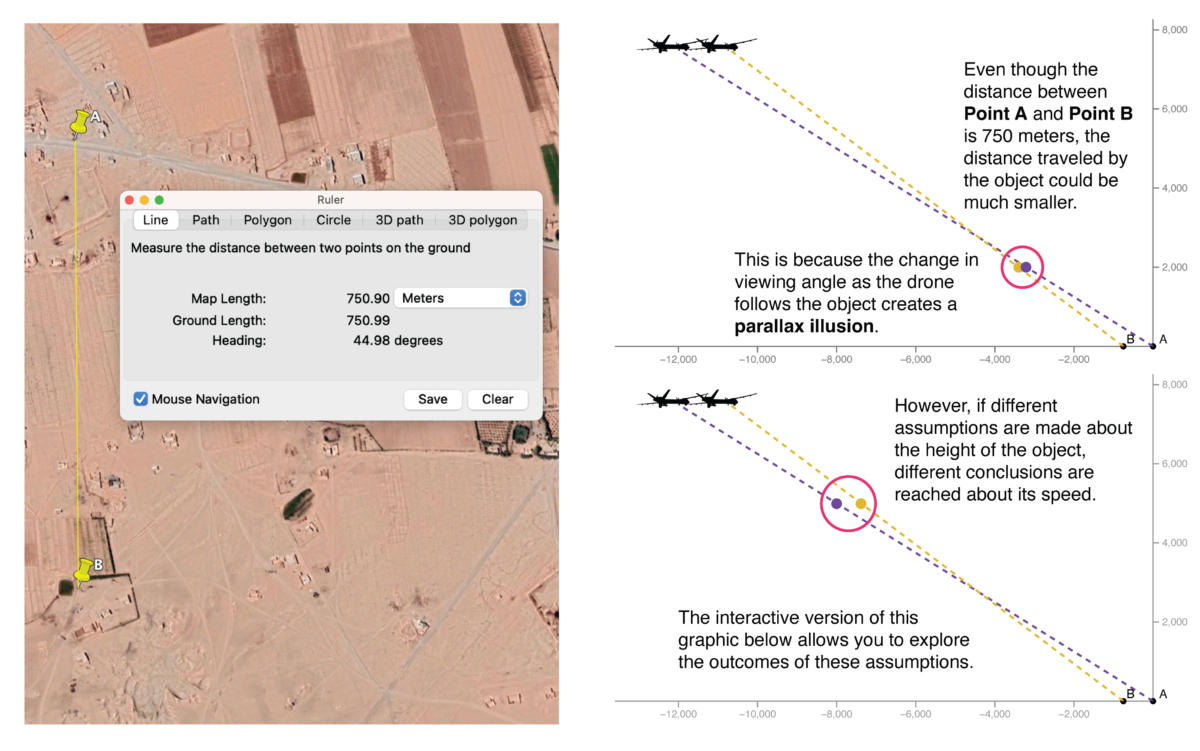
Historic weather data for July 12, 2022 forecasted winds of approximately 20 to 25 kilometres per hour at 0 metres to 3000 metres altitude, from a westerly direction. This puts the location of the UAP downwind of Deir ez-Zor, the largest city in eastern Syria. In the interactive graphic above, this roughly corresponds to the direction from point A to point B.
Maybe It’s A Boring Balloon
In the Armed Services Committee hearing, Kirkpatrick testified that “this is, essentially, all of the data we have associated with this event,” adding, “it is going to be virtually impossible to fully identify [the object] just based off of that video.”
Without more data to aid in a definitive identification, the current main hypotheses appear to be:
- Technology of extraterrestrial origin
- Technology of an unknown country
- Balloon
Indeed, AARO’s website lists ‘commercial or scientific balloons’ among common objects frequently reported as UAP.
A balloon is consistent with what we see in the video. They can be spherical, they can appear metallic (particularly those made of foil), and they can float in the air. According to the BBC Science Focus website, a helium balloon can float up to 10 kilometres – well below the operational ceiling of a Reaper drone.
Further supporting the balloon hypothesis is the video’s coinciding with Eid al-Adha, one of the two major holidays in Islam. The video is time-stamped July 12, 2022, the last day of the three-day holiday that year. Eid in Syria, as in other parts of the Muslim world, is celebrated with gifts, including balloons. Photos and videos from past Eid al-Adha celebrations in Damascus and Deir ez-Zor show balloons were present.
Historische Wetterdaten vom 12. Juli 2022 prognostizierten Windgeschwindigkeiten von etwa 20 bis 25 Kilometern pro Stunde in 0 Metern bis 3000 Metern Höhe aus westlicher Richtung. Damit liegt der Standort des UAP windabwärts von Deir ez-Zor, der größten Stadt im Osten Syriens. In der interaktiven Grafik oben entspricht dies ungefähr der Richtung von Punkt A nach Punkt B.
Vielleicht ist es ein langweiliger Ballon
In der Anhörung des Streitkräfteausschusses sagte Kirkpatrick aus, dass „das im Wesentlichen alle Daten sind, die wir mit diesem Ereignis in Verbindung gebracht haben“, und fügte hinzu: „Es wird praktisch unmöglich sein, [das Objekt] allein auf dieser Grundlage vollständig zu identifizieren.“ Video."
Ohne weitere Daten, die eine eindeutige Identifizierung ermöglichen, scheinen die aktuellen Haupthypothesen wie folgt zu lauten:
Technologie außerirdischen Ursprungs
Technologie eines unbekannten Landes
Ballon
Tatsächlich listet die AARO-Website „kommerzielle oder wissenschaftliche Ballons“ unter häufigen Objekten auf, die häufig als UAP gemeldet werden.
Ein Ballon entspricht dem, was wir im Video sehen. Sie können kugelförmig sein, sie können metallisch aussehen (insbesondere solche aus Folie) und sie können in der Luft schweben. Laut der Website von BBC Science Focus kann ein Heliumballon bis zu 10 Kilometer weit schweben – deutlich unter der Einsatzgrenze einer Reaper-Drohne.
Ein weiterer Beleg für die Ballon-Hypothese ist die Tatsache, dass das Video mit Eid al-Adha zusammenfällt, einem der beiden wichtigsten Feiertage im Islam. Das Video trägt den Zeitstempel 12. Juli 2022, den letzten Tag des dreitägigen Feiertags in diesem Jahr. Eid wird in Syrien, wie auch in anderen Teilen der muslimischen Welt, mit Geschenken, darunter Luftballons, gefeiert. Fotos und Videos von vergangenen Eid al-Adha-Feierlichkeiten in Damaskus und Deir ez-Zor zeigen Ballons.

So, while it’s exciting to imagine a 30 centimetre-wide alien spacecraft flying around the Middle East, Occam’s razor suggests that perhaps we’re just looking at a party balloon.
Während es also aufregend ist, sich ein 30 Zentimeter breites außerirdisches Raumschiff vorzustellen, das durch den Nahen Osten fliegt, deutet Occams Rasiermesser darauf hin, dass wir es vielleicht nur mit einem Partyballon zu tun haben.
Quelle: Bellingcat
